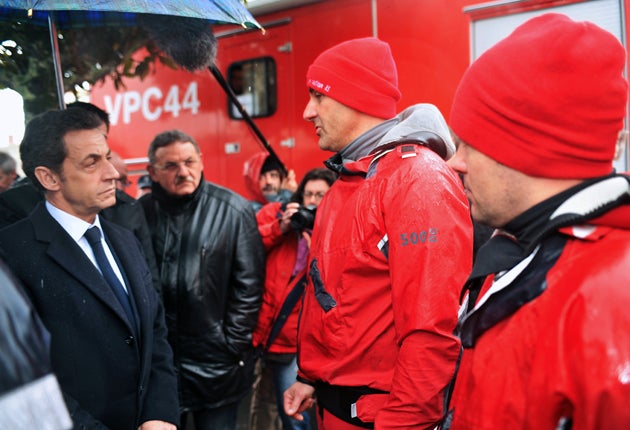Weak sea walls blamed for deaths in French storms
President visits flooded areas after 50 killed in worst weather for a decade

Your support helps us to tell the story
From reproductive rights to climate change to Big Tech, The Independent is on the ground when the story is developing. Whether it's investigating the financials of Elon Musk's pro-Trump PAC or producing our latest documentary, 'The A Word', which shines a light on the American women fighting for reproductive rights, we know how important it is to parse out the facts from the messaging.
At such a critical moment in US history, we need reporters on the ground. Your donation allows us to keep sending journalists to speak to both sides of the story.
The Independent is trusted by Americans across the entire political spectrum. And unlike many other quality news outlets, we choose not to lock Americans out of our reporting and analysis with paywalls. We believe quality journalism should be available to everyone, paid for by those who can afford it.
Your support makes all the difference.Rescue Teams scoured the devastated French Atlantic coast yesterday for survivors of the country's worst storm in a decade which left 50 people dead after eight-metre high waves crashed through ageing sea defences.
President Nicolas Sarkozy flew over flooded western regions yesterday and visited the town of L'Aiguillon-sur-Mer where 25 people died, including many trapped inside their homes when a sea wall collapsed under hurricane force winds and waves.
"We have to find out how families in France in the 21st-century can be surprised in their sleep and drowned in their own houses," Mr Sarkozy said at a meeting of local officials. "We have to shed light as urgently as possible on this unacceptable and incomprehensible drama."
Mr Sarkozy did not comment on criticisms of France's sea defences. But Philippe de Villiers, the head of the government for the western Vendèe region, said sea walls needed to be upgraded urgently.
"The sea wall that broke dates back to the Napoleon era. Either we build (new) sea walls, in which case they need to be taller, or we have to build further inland," he told France-Info radio station.
More than 9,000 firefighters searched homes for missing people after storm Xynthia pummelled France early on Sunday. Fifteen people were killed elsewhere in Europe.
Lt. Col. Patrick Vailli, spokesman for France's emergency services, said that nine people were still missing. Interior minister, Brice Hortefeux, said that hundreds of people were injured.
As rescue teams waded through floodwaters and rowed boats through flooded streets searching for people trapped in their homes, regional authorities warned that a combination of high winds and tides continued to pose a flood risk in the western Charente-Maritime region. Hundreds of families were sleeping in temporary shelters at schools and dance halls.
Georges Van Parys, 72, who rescued his disabled wife from their flooded home, said yesterday that the couple waited for six hours to be rescued from the roof of their car.
"I was in my underpants, my wife in her nightdress. We don't have any money or papers," he said.
The storm has exposed flaws in France's regional housing planning in flood-prone areas, where more than 10,000 homes have been built over the last decade. Secretary of State for Ecology, Chantal Jouanno, said: "There are regions where we absolutely cannot build. People must not build behind flood levees."
Mr Sarkozy said he was making €3m (£2.7m) of emergency funding available for victims. In the Charente-Maritime region, officials estimated that the cost of reparations from the storm would total €135m.
At least five people were killed in Germany, according to police, as the fierce gale swept the country late Sunday, mainly from falling trees. A two-year-old boy died in Frankfurt when he was blown into a river by a fierce gust of wind.
As the storm passed through Belgium leaving a trail of devastation in its wake, a man in his sixties was killed by a falling tree. In Portugal's Azores islands, a flash flood swept a school bus off a road. The driver and one child are missing on Sao Miguel, one of the archipelago's nine islands.
On the mainland, a 10-year-old boy was killed by a falling branch. In Barcelona, four children were killed when winds reaching almost 100 miles an hour brought down a sports stadium.
Join our commenting forum
Join thought-provoking conversations, follow other Independent readers and see their replies
Comments